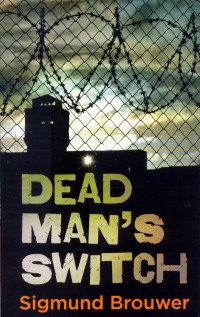| ________________
CM . . .
. Volume XXI Number 5. . . .October 3, 2014
excerpt:
Dead Man's Switch, by Sigmund Brouwer, is a fast-paced and action-packed thriller, with dangerous enemies, highly trained CIA agents, switching loyalties, and sinister motivations on each page; the stakes are high for the main character, and the story's action is urgent. Taking place in the present day, the story is set on MacNeil Island off the coast of the state of Washington. MacNeil Island is a prison island populated only by the nation's most dangerous criminals and the families of the guards. The main character, King, is a senior high school student within the MacNeil Island homeschool co-op, placed there because he has sped through the curriculum rather than because of his age, which is never specified beyond being younger than his grade would suggest. After a friend, Watt, seems to have drowned in the surrounding waters of the island, King receives a mysterious email supposedly triggered by Watt's death. A website that Watt had registered for automatically sends out emails to King after Watt misses entering the password that proves he is alive. This procedure is known as a dead man's switch, hence the book's title. These emails reveal that Watt had seemingly discovered a deadly conspiracy, one which disturbingly involves King's beloved father. King is thrust into making the choice to either follow in Watt's footsteps to expose the conspiracy or to ignore Watt's message and close his eyes to the corruption which surrounds him. His decision to confront the corruption and discover exactly what his father's role in the conspiracy really involves leads him on a race to outwit his enemies and escape their deadly ire. When it is revealed that Watt may still be alive and that King's comatose mother is in life-threatening danger, King becomes not only responsible for himself and for exposing the nefarious plot, but also responsible for saving the lives of others. Dead Man's Switch can be an engaging read, but it has some distracting flaws. Its complicated plot is consistent with the twists and turns inherent in the thriller genre, but the action in the book at times becomes convoluted and hard to follow. Often, Brouwer seems to require the reader to accept the action as it happens, without questioning how or why it is unfolding. He eventually provides the necessary information to understand the story's progression, but it becomes a tiresome formula, requiring the reader to flip back and forth between pages to connect the drama which unfolded with the explanation revealed post-action. All of this slows the story's pace down. A further issue within the plotting and pacing of the book are passages that feel out of place. For example, a brief theological discussion interrupts a chase scene. As criminals hunt the main characters through the dark forest of the island, King and his father discuss God's love for His children. It is meant to be a heart-warming moment, but it feels bizarre given the circumstances. Though the psychological and emotional effects of the action could have been more thoroughly explored, the shallow emotional development doesn't ruin the story. Dead Man's Switch does offer the readers an exploration of ethical dilemmas. For instance, one of the strengths of this book is its exploration of trust: trust between friends and, more importantly, trust between a parent and child. King struggles to determine the difference between trust and blind acceptance, and between betrayal of authority and critical thinking about leadership. The reader is left wondering if King's faith in others is misplaced, or whether it will be the very thing which ensures his survival to the end of the novel. Ethical considerations help to deepen the story, but Dead Man's Switch never quite meets the emotional or psychological potential inherent in the situations portrayed. As a popular, high-interest title, Dead Man's Switch will be enjoyed by readers who are looking for entertainment rather than depth, and it would be a good addition to a middle school or high school library hoping to entice reluctant readers. While more sophisticated young adults may find the shallow emotional core delivers an unsatisfying pay-off and an ultimately forgettable novel, reluctant audiences may be appreciative of the plot-focused story and quick pace. Recommended. Devon Galitsky has a literature degree from the University of the Fraser Valley and lives in Chilliwack, BC.
To comment
on this title or this review, send mail to cm@umanitoba.ca.
Copyright © the Manitoba Library Association. Reproduction for personal
use is permitted only if this copyright notice is maintained. Any
other reproduction is prohibited without permission.
CM Home | Next Review | (Table of Contents for This Issue - October 3, 2014.) | Back Issues | Search | CM Archive | Profiles Archive |
